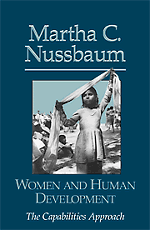CONCLUSION
Published online by Cambridge University Press: 05 June 2012
Summary
Women in much of the world lose out by being women. Their human powers of choice and sociability are frequently thwarted by societies in which they must live as the adjuncts and servants of the ends of others, and in which their sociability is deformed by fear and hierarchy. But they are bearers of human capabilities, basic powers of choice that make a moral claim for opportunities to be realized and to flourish. Women's unequal failure to attain a higher level of capability, at which the choice of central human functions is really open to them, is therefore a problem of justice.
I have argued that a political approach based on ideas of human capability and functioning supplies a good basis for thinking about these problems, helping us to construct basic political principles that can serve as the foundation for constitutional guarantees to which nations should be held by their citizens. I have also argued that the capabilities framework provides a good orientation for comparative quality of life measurement when nations are compared. In both areas, the approach supplies better guidance than approaches based on utility or on opulence (GNP per capita). The approach, I have argued, also helps us to think well about two of the most difficult issues facing international development today: the legal and political status of religion, and the legal and political status of the family.
- Type
- Chapter
- Information
- Women and Human DevelopmentThe Capabilities Approach, pp. 298 - 304Publisher: Cambridge University PressPrint publication year: 2000

